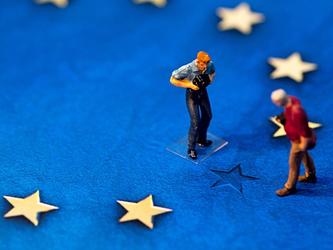Bridging the Brexit gap
I couldn’t believe the [referendum] result, I deleted Hailo and downloaded Uber that day” (Male, 27, London, Remainer)
This was a quote from a respondent of Brexometer – Flamingo’s panel that tracks European consumer sentiment in a post-Brexit world, and what this means for brands. Initial research, focused on the UK, also involved meeting leave and remain voters from all corners of the country: from Machynlleth to Barnstaple via Canterbury, Sheffield and Dunfermline.
Among those we met, comments like the above were typical. The picture the quote paints is a binary one: that on the one hand you have remainers, who are young, affluent, urban and culturally enlightened, while on the other, you have leavers, who are older, rural, more working class and insular. We heard leavers brand remainers an ‘out of touch elite’. And remainers call leavers ‘duped racists’.
polarising
Such radical and extreme perceptions of those who voted differently are not surprising given the referendum question was: “Should the United Kingdom remain a member of the European Union or leave the European Union?”
Unlike elections, where we vote on a manifesto, this was an either/or, in or out decision. In fact, there was a palpable lack of vision around what a post-referendum world would actually look like (both from the leave and remain camps), and we’re still trying to work that out. ‘Brexit means Brexit’ is a clever piece of rhetoric because it is as committed as it is non-committal.
But through spending time with people, listening to their stories and standing in their shoes, we quickly saw that this binary view of the world was far too simplistic. In fact, it was a fragile veneer, propagated by politicians and the media to whip up votes and sell papers.
The picture emerging from our research is a far more complex and nuanced one. The underlying emotional driver was a feeling of powerlessness. As one of our respondents put it: “It doesn’t matter if you’re in Europe or not, none of them are going to give a shit about us.” And this was why the argument around taking back control resonated so strongly. It spoke to people on an individual level, promising them a voice. And this is a universal need – everyone (leave and remain alike) has a fundamental need to feel represented, heard and understood.
Shared Values
Of course one person is different from the next; we drive different cars, support different football teams, drink different beer. But we are not so divided. It’s not ‘us and them’. We are not two camps of people, just like we will not neatly fit into four or six segments. In fact, we all share some powerful ideas and values – resolving a problem over a cup of tea, the childish joy of jumping up and down in a muddy puddle or singing in the shower.
So how can brands transcend the fictitious battle lines that have been drawn? And why should they care about this?
Commercially, if brands want growth, they can’t ignore 52% of the population. When pubs recognised the opportunity for women and families to enjoy relaxed get-togethers, the ‘style’ bar (think Pitcher & Piano) and the gastropub were born.
The power of we
And culturally, we need shared experiences, values, beliefs and practices in order to communicate and be understood. The more we have in common with others, the closer we feel and the happier we become.
As Mark Earls, author of Herd: how to change mass behaviour by harnessing our true nature wisely, said: “We are a community species; we want to be together; we are made to be together; we are made by being together; and we are happier by being together”
When it feels like there is more that divides than unites us, and when moments of synchronicity feel increasingly rare, brands can provide these anchor points – but they need to play by the new rules.
Re-framing our view
We need to recognise that what the creative industry sees as aspirational might actually be alienating: trying exotic new cuisines, cycling to work and playing Pokémon Go – these things can be framed as democratic (it’s street food, it’s not a car, it’s a smart phone game), but actually are still the preserve of the elite, targeted towards urban dwellers with fast-paced lifestyles and generous data packages.
Finally, we need empathy. We are not consumers. We are humans, who share a common humanity. Shows like Channel 4’s Gogglebox and First Dates are so successful because they show us the world through someone else’s eyes. We stand in their shoes, and even if we don’t agree, we understand.
Zoe Fenn is head of UK practice at Flamingo

We hope you enjoyed this article.
Research Live is published by MRS.
The Market Research Society (MRS) exists to promote and protect the research sector, showcasing how research delivers impact for businesses and government.
Members of MRS enjoy many benefits including tailoured policy guidance, discounts on training and conferences, and access to member-only content.
For example, there's an archive of winning case studies from over a decade of MRS Awards.
Find out more about the benefits of joining MRS here.













0 Comments